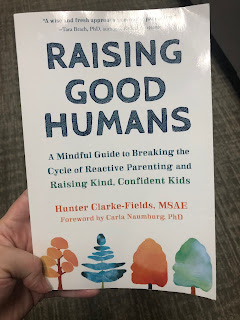Hi all!
I recently picked up "Raising Good Humans" by Hunter Clarke-Fields (affiliate link) for personal reasons. I have a son and wanted some strategies to help me navigate the toddler years tantrums. However, as I was reading it, I couldn't help but think of all the applications these strategies could have in therapy. We all know that building rapport with a student makes all the difference in their ability to succeed. And this book is full of ideas and strategies for how to do that. Here are some of the key take aways that I got from this book:
1.) You literally CANNOT access the rational part of your brain when the stress response is triggered. We cannot expect a child to act rationally when they feel upset, threatened, or overwhelmed. Also, being hurried can trigger the stress response - think about that when shuffling students to and fro to get their 30 minutes of therapy. I know I rushed students through activities so that we could get the most out of their short time with me. But did we really get the most when their stress response was probably triggered??
2.) Acknowledging how a child is feeling before trying to problem solve for them allows them to feel seen and heard - a great way to build rapport. So often, I want to fix things for my students, but first I need to help them process their emotions and then COACH them through problem solving on their own. It seems like common sense, but in those situations, sometimes it's hard to do.
3.) This book also has a ton of strategies to help YOU keep your emotions in check in difficult times. The book refers to times when your children are fighting or having a tantrum, but the strategies would totally apply in situations were a student is having a meltdown. I often struggle with keeping my emotions in check, so I liked learning all about strategies like mindful meditation, acknowledgement, patience, mindful acceptance, and RAIN.
4.) The author understands that we are not going to be perfect at this, so she also gives strategies for what to do when you fail to repair the relationship and how to practice self-compassion.
5.) This book also has a ton of communication tips and strategies to help you avoid communication barriers with children.
6.) Finally, each chapter has several exercises for you to do to practice building these skills. I felt like the exercises were extremely helpful.
If you are a parent, this book is perfect for helping you to build those relationships with your child. If you are an SLP, you will have to adapt the information a bit to apply it to your students. But it's still relevant. If you work in a setting where you will be doing parent coaching, like Early Intervention, this book is full of ideas that you can give parents to support their relationships with their children. It has given me tools and language to share with several of my patients' parents. Overall, it's a great read!

No comments:
Post a Comment